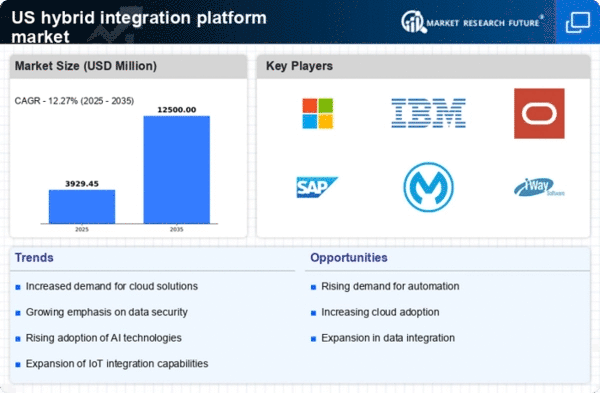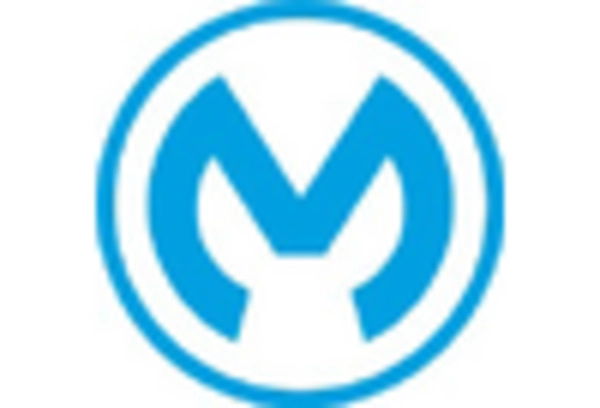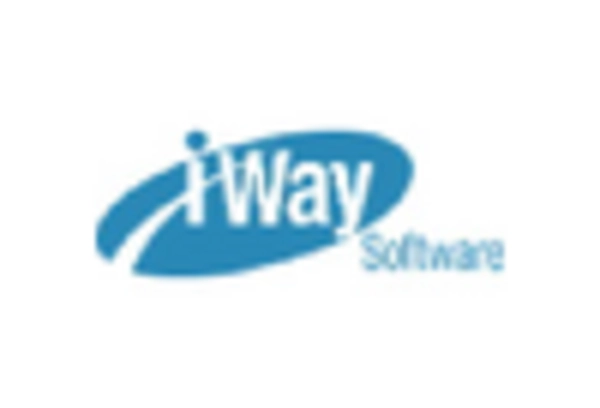Rising Need for Seamless Connectivity
The hybrid integration-platform market is experiencing a notable surge in demand for seamless connectivity across diverse applications and systems. Organizations are increasingly recognizing the necessity of integrating on-premises and cloud-based solutions to enhance operational efficiency. This trend is driven by the need for real-time data access and streamlined workflows. According to recent estimates, the hybrid integration-platform market is projected to grow at a CAGR of approximately 25% over the next five years. This growth is indicative of businesses striving to eliminate data silos and improve collaboration among teams. As enterprises continue to adopt digital transformation strategies, the hybrid integration-platform market is likely to play a pivotal role in facilitating these integrations, thereby enhancing overall productivity and responsiveness.
Escalating Focus on Operational Agility
In the current business landscape, the hybrid integration-platform market is witnessing an escalating focus on operational agility. Companies are increasingly seeking solutions that allow them to adapt swiftly to changing market conditions and customer demands. This agility is essential for maintaining competitiveness and fostering innovation. The integration of various systems and applications enables organizations to respond more effectively to market fluctuations. As a result, the hybrid integration-platform market is projected to reach a valuation of over $10 billion by 2026. This growth reflects the increasing recognition of the importance of agile operations in driving business success. Organizations that leverage hybrid integration platforms are likely to enhance their ability to pivot and innovate, thereby positioning themselves favorably in their respective industries.
Growing Emphasis on Data-Driven Decision Making
The hybrid integration-platform market is significantly influenced by the growing emphasis on data-driven decision making among organizations. As businesses accumulate vast amounts of data, the ability to integrate and analyze this information becomes crucial for strategic planning and operational efficiency. Hybrid integration platforms facilitate the consolidation of data from various sources, enabling organizations to derive actionable insights. This trend is underscored by the fact that companies utilizing data analytics are 5 times more likely to make faster decisions than their competitors. Consequently, the hybrid integration-platform market is expected to expand as organizations prioritize data integration solutions that support informed decision-making processes. This shift towards data-centric strategies is likely to drive further investments in hybrid integration technologies.
Heightened Demand for Enhanced Customer Experiences
The hybrid integration-platform market is increasingly driven by heightened demand for enhanced customer experiences. Organizations are striving to provide personalized and seamless interactions across multiple channels, necessitating the integration of various customer touchpoints. Hybrid integration platforms enable businesses to unify customer data and interactions, leading to improved service delivery and customer satisfaction. As companies invest in technologies that enhance customer engagement, the hybrid integration-platform market is expected to grow significantly. Recent studies indicate that organizations that prioritize customer experience are 60% more profitable than their competitors. This underscores the importance of integrating systems to create a holistic view of customer interactions. Consequently, the hybrid integration-platform market is likely to see continued expansion as businesses seek to elevate their customer experience strategies.
Increased Investment in Digital Transformation Initiatives
The hybrid integration-platform market is benefiting from increased investment in digital transformation initiatives across various sectors. Organizations are recognizing the need to modernize their IT infrastructure to remain competitive in an increasingly digital world. This investment often includes the adoption of hybrid integration platforms that facilitate the integration of legacy systems with modern applications. As businesses allocate substantial budgets towards digital transformation, the hybrid integration-platform market is projected to witness robust growth, with estimates suggesting a market size exceeding $15 billion by 2027. This trend indicates a broader shift towards embracing innovative technologies that enhance operational efficiency and customer engagement. The hybrid integration-platform market is likely to be at the forefront of this transformation, enabling organizations to leverage their existing assets while adopting new technologies.
















